Academic Advice
[Your Name]
[Your Address]
[City, State, ZIP Code]
[Email Address]
[Phone Number]
[Date]
[Recipient's Name]
[Recipient's Address]
[City, State, ZIP Code]
Dear [Recipient's Name],
I hope this letter finds you in good health and spirits. I am writing to offer you some advice regarding your academic journey. Having been through similar experiences, I understand the challenges that can arise and would like to share some insights that I believe will be helpful.
[Provide personalized advice and insights related to academics, study habits, time management, seeking help from professors, participating in extracurricular activities, etc.]
Remember, your academic journey is a valuable opportunity for personal growth and development. Embrace each challenge as a chance to learn and improve. Stay focused, maintain a positive attitude, and don't hesitate to seek guidance whenever needed.
Wishing you the best of luck in your academic pursuits.
Sincerely,
[Your Name]
Career Advice
[Your Name]
[Your Title]
[Company Name]
[Company Address]
[City, State, ZIP Code]
[Email Address]
[Phone Number]
[Date]
[Recipient's Name]
[Recipient's Address]
[City, State, ZIP Code]
Dear [Recipient's Name],
I trust this letter finds you well. I wanted to share some career advice based on my own experiences in the [industry/field]. Navigating the professional world can be both exciting and challenging, and I hope the following insights will be beneficial to you.
[Offer personalized advice related to career growth, networking, skill development, work-life balance, handling challenges, etc.]
Remember, each step you take in your career contributes to your overall growth. Embrace new opportunities, continuously learn, and cultivate a strong professional network.
Wishing you a fulfilling and successful career journey.
Best regards,
[Your Name]
Health and Wellness Advice
[Your Name]
[Your Address]
[City, State, ZIP Code]
[Email Address]
[Phone Number]
[Date]
[Recipient's Name]
[Recipient's Address]
[City, State, ZIP Code]
Dear [Recipient's Name],
I trust you're in good health. I wanted to offer some advice related to your well-being, as taking care of oneself is of utmost importance. Here are some insights that I believe will contribute to your overall health and wellness.
[Provide personalized advice related to physical activity, nutrition, mental health, stress management, self-care practices, etc.]
Remember, prioritizing your health is an investment in a better quality of life. Small, consistent changes can lead to significant improvements over time.
Wishing you vitality and wellness on your journey.
Take care,
[Your Name]
Financial Advice
[Your Name]
[Your Address]
[City, State, ZIP Code]
[Email Address]
[Phone Number]
[Date]
[Recipient's Name]
[Recipient's Address]
[City, State, ZIP Code]
Dear [Recipient's Name],
I hope this letter finds you well. I wanted to share some insights regarding financial management, as I believe making informed choices in this aspect can lead to long-term stability and security. Here are some pieces of advice that I hope you find helpful.
[Offer personalized advice related to budgeting, saving, investing, debt management, financial goals, etc.]
Remember, financial well-being is built upon smart decisions and disciplined habits. Planning for the future while being mindful of your present needs is key.
Wishing you financial prosperity and peace of mind.
Best regards,
[Your Name]
Professional Letter of Advice Regarding Investment
Subject: Investment Advice
Dear [Recipient Name],
I hope this message finds you well. I am writing to provide professional guidance regarding your potential investment in [project/company]. Based on my review of the financial statements, market trends, and risk factors, I recommend that you consider [specific advice, e.g., diversifying, deferring, or proceeding cautiously].
Please ensure that all legal and financial due diligence is completed before proceeding. Should you require further clarification or assistance, I am available to discuss this matter at your convenience.
Sincerely,
[Your Name]
[Title/Position]
[Organization]
Casual Letter of Advice to a Friend
Subject: Some Advice for Your Upcoming Move
Hi [Friend Name],
I heard you’re planning to move to [City/State]. I just wanted to share a few tips based on my experience. Make sure you check out the neighborhoods for safety and amenities, plan your budget carefully, and connect with locals or expat communities for support.
I hope this helps make your move smoother. Feel free to call me if you want more detailed tips or a checklist!
Best,
[Your Name]
Preliminary Legal Advice Letter
Subject: Preliminary Advice Regarding Legal Matter
Dear [Client Name],
Following our recent discussion, I am providing preliminary guidance regarding [legal issue]. At this stage, it appears that your options include [outline options briefly]. It is essential that you review all relevant documents and consider the potential risks and benefits before making a decision.
Please treat this as initial advice; a detailed analysis will follow upon receipt of all necessary documentation.
Kind regards,
[Your Name]
[Law Firm/Position]
Elements and Structure of an Effective Letter of Advice
- Subject/Heading: Clearly states the topic of advice.
- Greeting: Personalized to the recipient.
- Introduction: Brief context of why advice is being given.
- Body: Detailed guidance, options, and considerations.
- Recommendations: Clear suggestions or next steps.
- Closing: Professional sign-off with availability for follow-up.
- Attachments: Supporting documents or references if applicable.
Who Should Write a Letter of Advice
- Professionals with expertise in the relevant field (e.g., lawyers, financial advisors, consultants).
- Mentors or senior colleagues providing guidance.
- Trusted friends or family, in informal scenarios.
- Must have sufficient knowledge or experience to provide reliable recommendations.
Whom Should a Letter of Advice Be Addressed To
- Individuals seeking guidance or clarification.
- Organizations requesting formal advice.
- Colleagues or teams needing direction on specific projects.
- Clients or customers in professional contexts.
When a Letter of Advice is Typically Needed
- Prior to making significant financial decisions.
- Before entering into contracts or legal agreements.
- During career planning or major life choices.
- When seeking professional guidance for business or personal matters.
- To formalize recommendations for record-keeping purposes.
How to Write and Send a Letter of Advice
- Determine the purpose and scope of advice.
- Research and gather relevant facts and documentation.
- Choose the appropriate tone: formal for professional advice, casual for personal guidance.
- Structure the letter logically: introduction, body, recommendations, conclusion.
- Send via email for convenience or print for formal/professional contexts.
- Keep a copy for records and follow-up reference.
Formatting Guidelines for a Letter of Advice
- Length: 1–2 pages depending on complexity.
- Tone: Professional, clear, and neutral; casual if appropriate.
- Style: Concise paragraphs, bullet points for clarity if needed.
- Mode: Email or printed letter depending on formality.
- Wording: Clear, actionable, and supportive.
Requirements and Prerequisites Before Sending a Letter of Advice
- Understand the recipient’s needs and context.
- Collect all necessary information and data.
- Ensure advice is accurate, feasible, and ethical.
- Verify compliance with professional or legal standards.
- Review letter for clarity, correctness, and tone.
Common Mistakes in Letters of Advice
- Being vague or ambiguous about recommendations.
- Offering advice outside your area of expertise.
- Using overly technical or complex language for non-expert recipients.
- Ignoring potential risks or limitations.
- Failing to provide actionable next steps.
Tricks and Tips for Writing Effective Letters of Advice
- Use bullet points for multiple recommendations.
- Highlight critical advice for emphasis.
- Maintain a neutral and supportive tone.
- Provide references or supporting documents.
- Offer availability for follow-up questions.
After Sending a Letter of Advice: Follow-Up Steps
- Confirm receipt with the recipient.
- Be available to clarify or expand on recommendations.
- Document any responses for your records.
- Revise or supplement advice if additional information emerges.
Pros and Cons of Sending a Letter of Advice
Pros:
- Provides clear, formal guidance.
- Helps recipients make informed decisions.
- Can be used as a reference for future actions.
Cons:
- May be misinterpreted if unclear.
- Responsibility lies with advisor for accuracy and feasibility.
- Can create expectations of ongoing support.
FAQ About Letters of Advice
-
Q: Can advice be given informally via email?
A: Yes, for casual contexts, but formal letters are better for professional matters. -
Q: Should all options be listed?
A: Yes, provide alternatives and explain pros and cons. -
Q: Is a signature required?
A: For formal letters, yes; for casual emails, optional. -
Q: Can advice be legally binding?
A: Usually not, unless formalized in a contract or professional engagement.
Compare and Contrast: Letter of Advice vs. Recommendation Letter
- Letter of Advice: Provides guidance, options, and considerations; neutral tone; may include warnings or risks.
- Recommendation Letter: Supports or endorses a person or proposal; persuasive and positive tone.
- Similarity: Both are formal written communications addressing a recipient’s needs.
- Difference: Advice focuses on action and decisions; recommendation focuses on endorsement.
Does a Letter of Advice Require Authorization?
- Professional letters may require authorization if representing a company or organization.
- Legal, financial, or medical advice may need to be provided only by licensed professionals.
- Ensures responsibility, compliance, and validity of the advice provided.
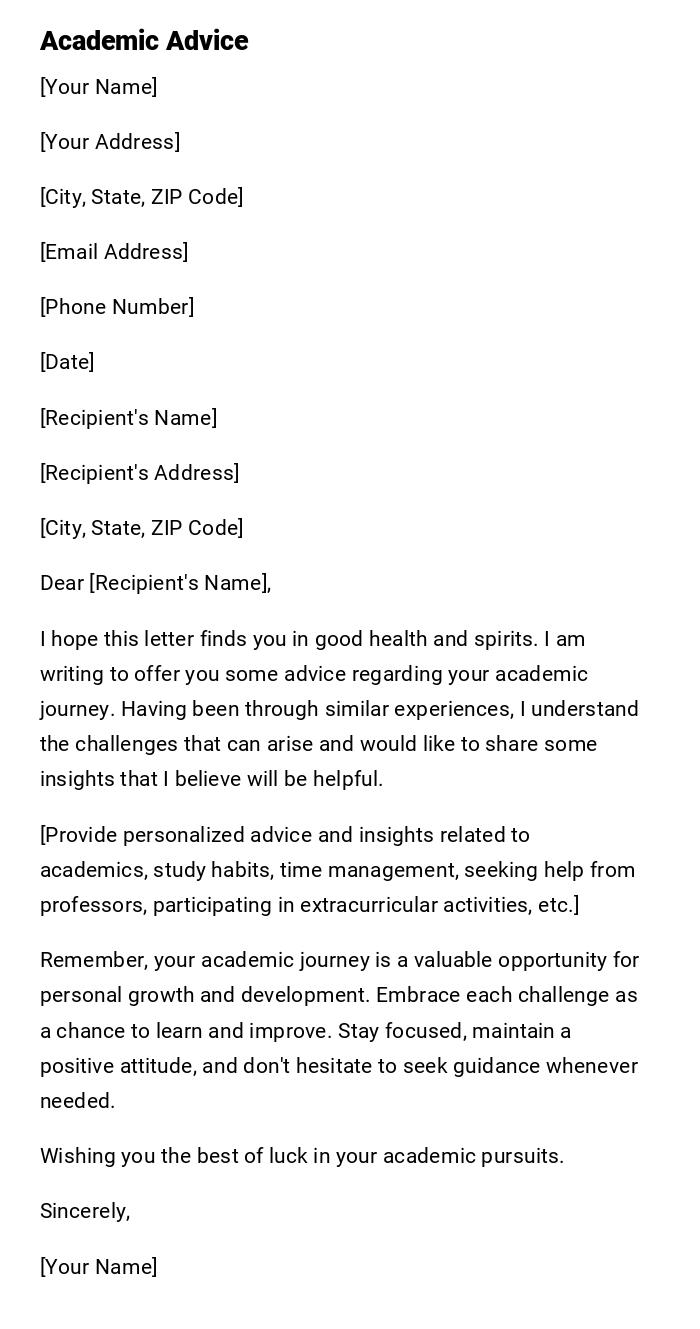
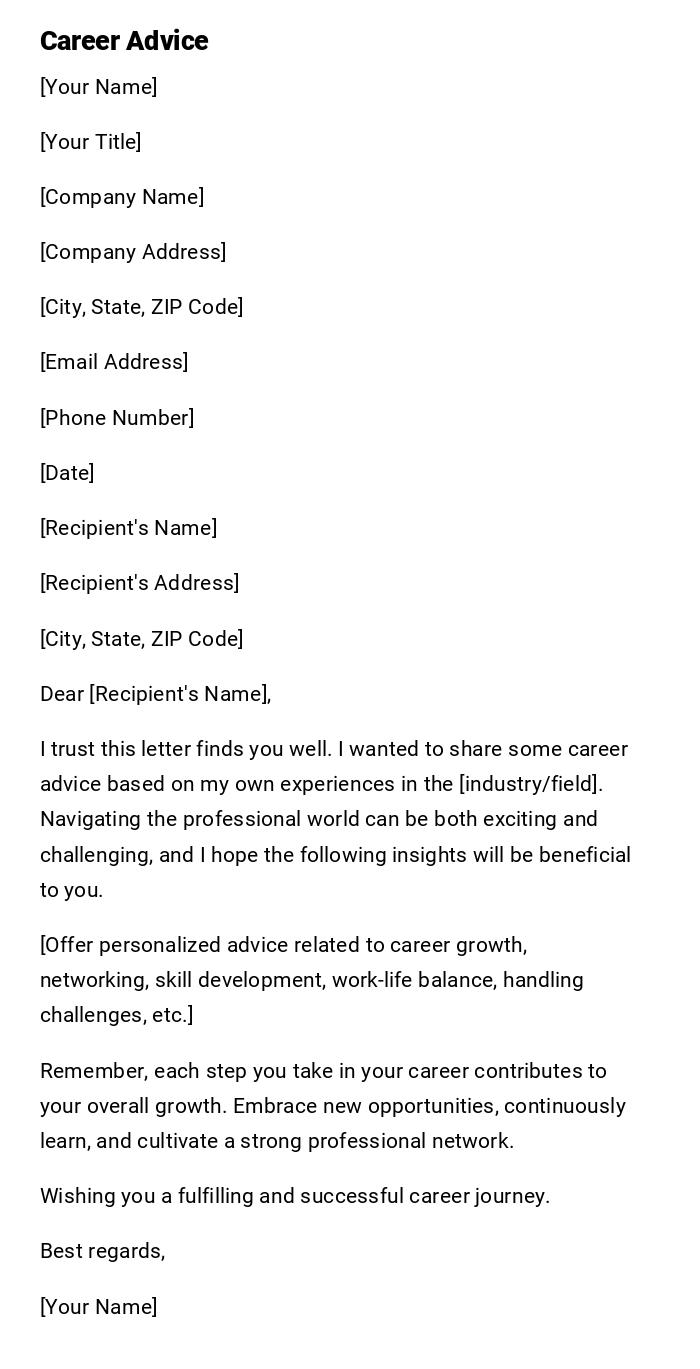
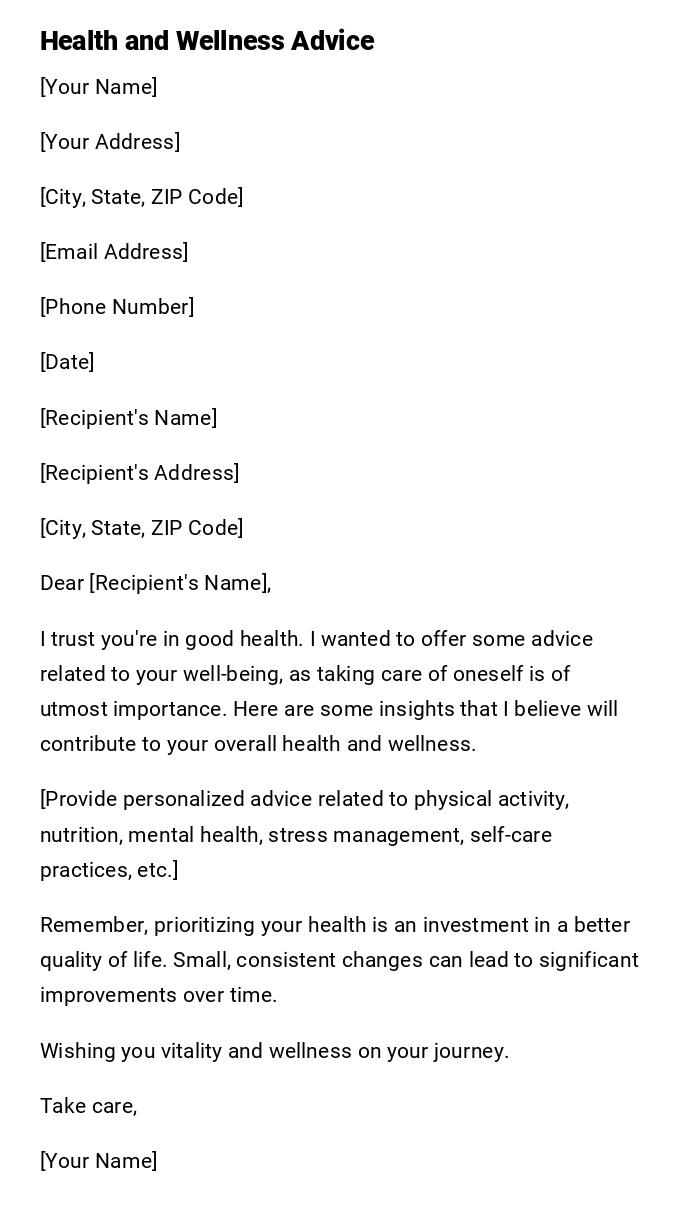
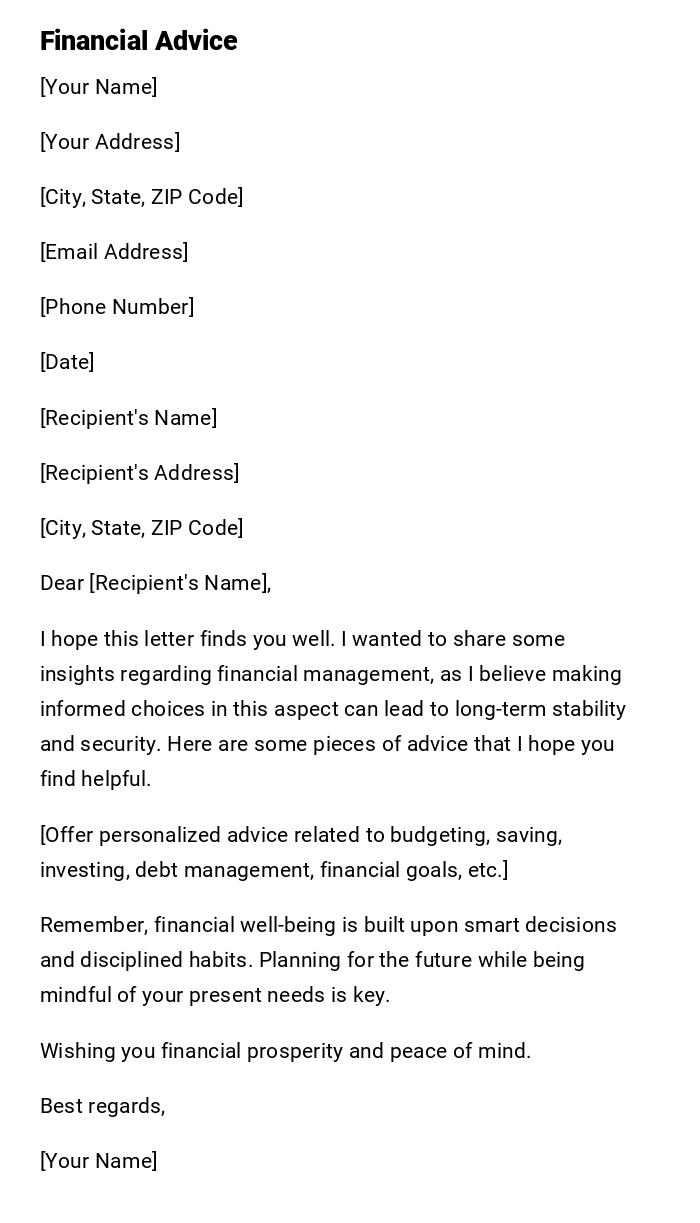
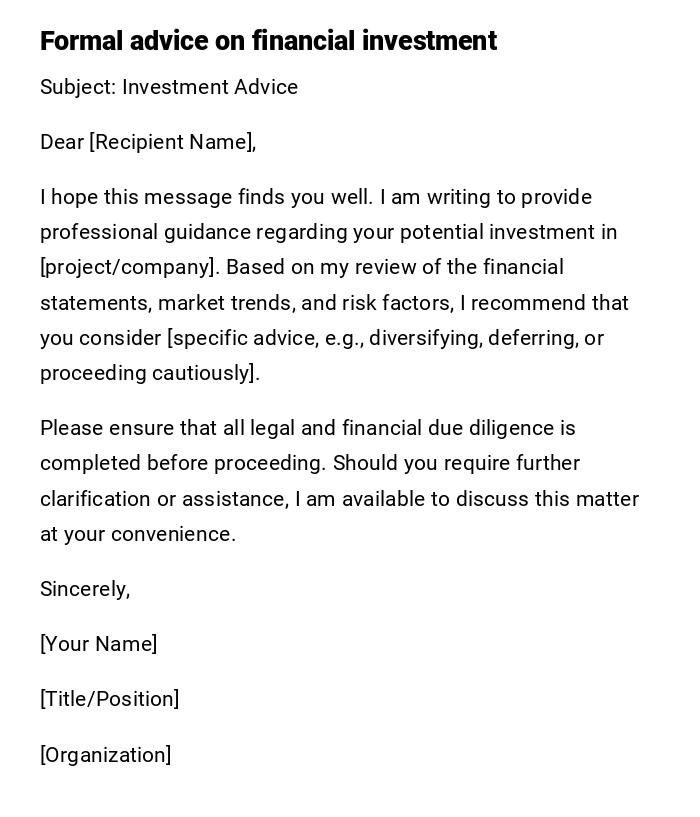
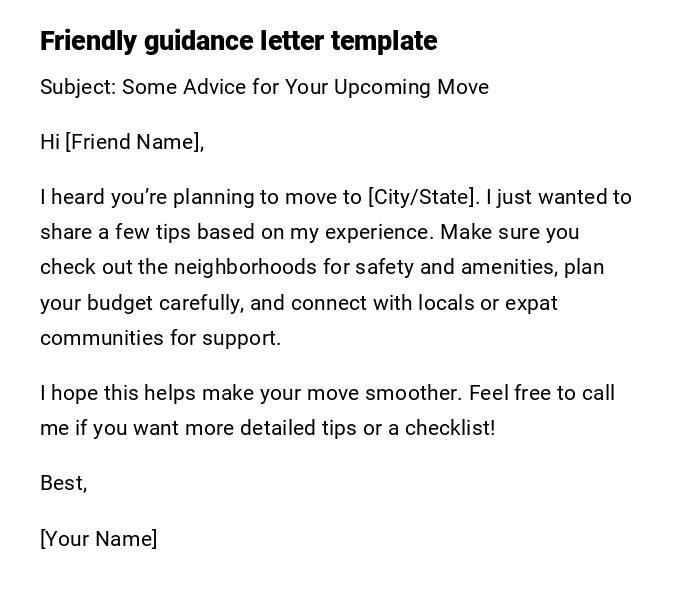
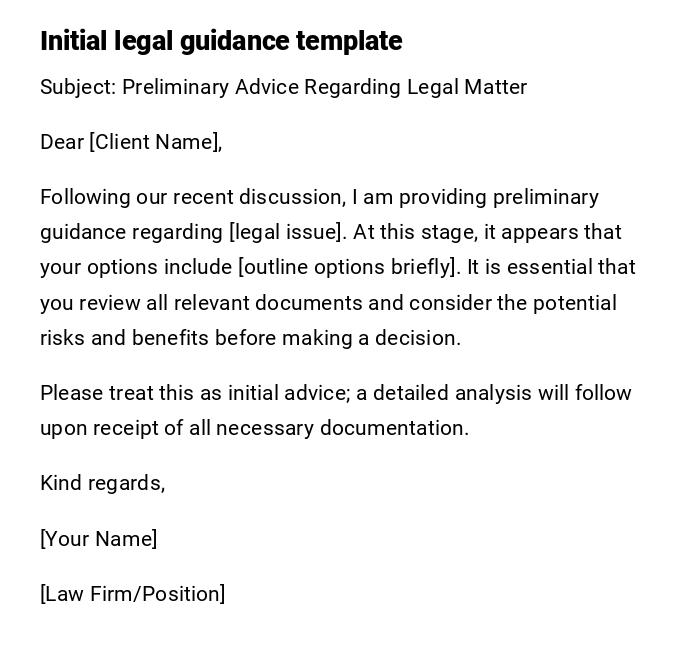
Advice Letter To A Friend
Advice Letter To Employee
Advice Of Dispatch Letter
Bank Advice Letter
Career Advice Letter
Legal Letter Of Advice To Client
Letter Asking For Advice
Payment Advice Letter
Resignation Letter Advice
Salary Advice Letter
Tax Advice Letter
Thank You For Advice Letter

 Download Word Doc
Download Word Doc
 Download PDF
Download PDF